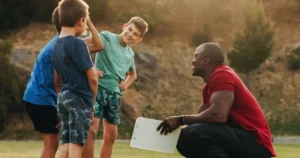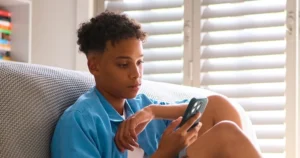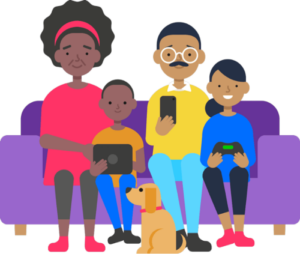Coaches and other professional men in young boys’ lives play an important role in challenging misogyny and hate.
Learn how with insight and guidance from The NWG Network’s Kevin Murphy.
Summary
- What does misogyny look like in sport?
- How many girls experience misogyny?
- The role of bystanders in spreading hate
- What can male role models do about misogyny?
- The harm of gendered insults
- Supporting resources
What does misogyny look like in sport?
During the Women’s Euros in June 2022, an image surfaced on social media. It was the crest for England’s women’s national football team, but instead of three lions, there were three irons. Despair, rage and anger coursed through my veins when I saw this image. To think that society still has these deep-seated misogynistic behaviours displayed so openly online is so very worrying.
One dad, Barney, shared his own daughter’s experience with this type of misogyny in sport. As she browsed online forums to support her love of football, she regularly came across “countless threads and comments about women in football, both as fans and players.”
The messaging often said that women’s football was not of the same standard as men’s. Or, it would say that women should be at home, not playing football. Further comments against the footballers’ appearance also added to the narrative. See how Barney and his daughter approached the difficult subject.
How many girls experience misogyny?
What impact do these posts have on the developing minds of our children? How can we possibly challenge these misogynistic narratives and posts? And how can we challenge the source of this behaviour?
Everyone’s Invited
Back in 2020, activist Soma Sara founded her website Everyone’s Invited. She designated it as a safe place for girls to share their stories of sexual abuse, harassment and rape culture at schools and universities. The response was overwhelming, and the website caught the eye of Ofsted.
Ofsted went on to investigate this issue in schools more closely, and the startling statistic was published in a report to Government. It said: “9 out of 10 girls had received unsolicited images and been subject to sexist name calling.”
One would think our schools would be safe spaces for learning. However, this statistic casts shadows over boys’ behaviour towards girls in school, both physically and digitally.
Everyone’s Invited continues to see these stories added daily from girls, women, boys and men from around the globe.
There are so many resources, support groups and educational materials for schools online. While they can help counter these abusive behaviours and negative attitudes towards girls, simply ‘passing the buck’ to schools is not the answer.
The role of bystanders in spreading hate
A bystander is someone who witnesses or hears about a situation that can impact another person’s safety or wellbeing. Often, a bystander is a person who simply ‘stands by’ without taking action. This can happen both online and offline.
Active bystanders, often called ‘upstanders’ in schools and with younger children, are those who intervene. They do something to support victims or challenge perpetrators. For instance, they might report the behaviour online, tell a teacher, share information to counter the narrative or reach out to the victim to show them they are not alone.
Passive bystanders do nothing, and this is the problem. Everyone’s Invited clearly shows that in so many situations, there are too many passive bystanders. This must change. We need more active bystander interventions in communities, schools and all the other settings that our children access.
In “Armies of Enablers” by Professor Amos Guiora, numerous survivors of sexual abuse in American sport share their stories. These stories feature themes around those people — the enablers — in victims’ lives who failed to intervene during incidents of grooming or abuse.
Everyone’s Invited shows that those in Education and Sport are just as complicit in the systematic abuse of so many children as the enablers in Guiora’s book. Essentially, many people just stand by without doing or saying anything.
What can male role models do about misogyny?
Many have heard of the old proverb, “It takes a village to raise a child.” In today’s digital society, those words are truer than ever. Professionals, parents and extended family all have a responsibility to support the children in their lives. As such, we need to develop this village mentality to support our boys and challenge misogynistic behaviours that they come across online or off.
The influence of the internet cannot be underestimated, especially with those like Andrew Tate who have the support of many followers across social media platforms. We need more male adults and young men to become ‘active bystanders’, supporting boys in their decision-making and challenging their language and behaviour towards women and girls.
There’s no ‘silver bullet’ that can fix the problem. But, more authentic connections with communities of men who will help challenge everyday misogyny among boys can help. These men won’t laugh at a sexist joke, and they’ll talk to boys about porn and the unrealistic portrayal of women. They’ll challenge the learned perception of women as sex objects and the resulting negative behaviour towards girls.
The harm of gendered insults
How many times have we heard ‘girl’ used as an insult in sport? We need men to challenge those who tell boys to ‘stop playing like a girl’ or similar such insults. Using ‘girl’ as an insult only creates greater gender inequality, teaching boys that to be a girl means to be something less than.
Inequality creates vulnerability, which is a trait that offenders sadly target. That earlier statistic from Ofsted demonstrates just how much vulnerability we’re creating in schools and in the digital world. To counter this, we also need to challenge victim-blaming language rather than writing it off as banter or telling kids to ‘just ignore it’.
Words and language matter; abuse and sexual assault start with words, often from a very young age. If this isn’t challenged, kids become emboldened to keep using it, leading to boys seeing such abusive behaviours as normal.
So, we need communities of men to shape and guide boys and challenge toxic masculinity. Boys don’t need lecturing, they need guidance, care and compassion as they navigate the transition towards adulthood.





